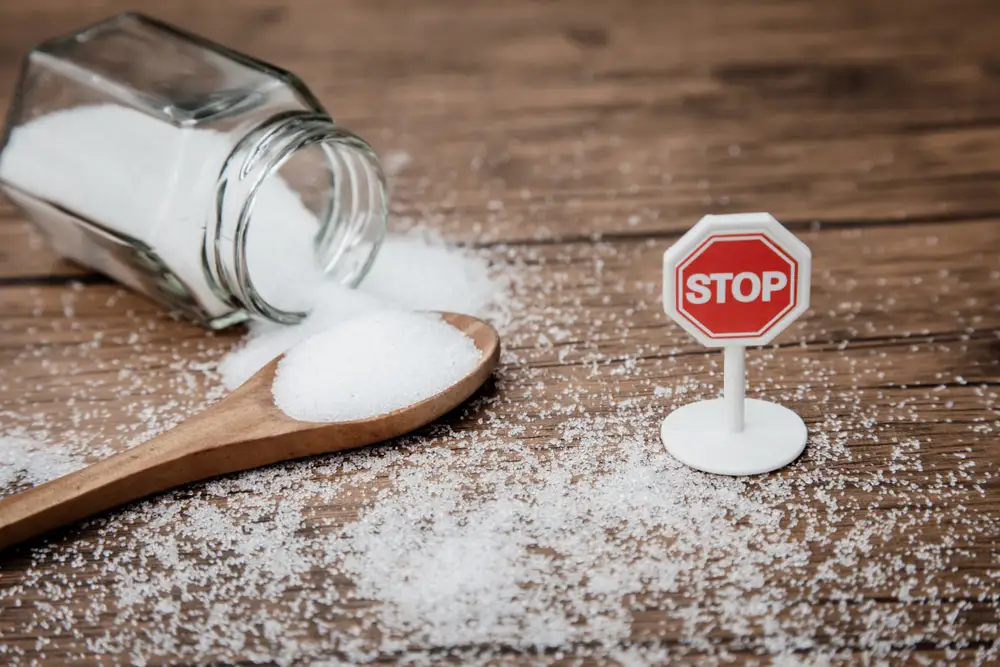Sugar is a type of carbohydrate and a source of energy for our bodies. It can occur naturally in foods like fructose in fruit, glucose in fruits and vegetables, and maltose in wheat and barley. However, manufacturers also often add sugar to extend the shelf life of foods, improve their appearance and/or make them taste sweeter.
Naturally-occurring sugars are not necessarily healthier than “added” sugars. But they are more likely to be in foods alongside beneficial nutrients such as fibre, vitamins and minerals. Added sugars tend to be found in foods high in kilojoules and low in vitamins and minerals. Those high in kilojoules are known as “energy dense” and don’t necessarily meet our dietary needs.
So how much sugar per day is recommended, and what foods are high in added sugars?

Average Consumption Of Sugar
According to a study done by the Australian Bureau of Statistics from 2011 to 2012, Australians’ average consumption of sugar was an average of 60 grams of sugar per day, with the majority of intake coming from added sugars (12 teaspoons!). This equates to 11 per cent of an adult’s daily kilojoules and 13 per cent of a child’s.
These figures may be worrying, but not surprising. This is because large amounts of sugar are in sweetened products like lollies, baked goods and sugary drinks. But sugar is also “hidden” in savoury products like pre-made soups and pasta sauces, so keeping track of our intake can be challenging.
The study also showed that the majority (81 per cent) of added sugars were consumed from energy-dense, nutrient-poor “discretionary” foods and beverages. Just over half of added sugars were consumed from beverages, with the leading beverages being cordial, soft drinks, electrolyte and energy drinks and fruit and vegetable juices. The leading foods were confectionary, cakes and muffins.
However, the good news is that these figures have dropped over the past decade, although many Australians still exceed the recommended 10 per cent daily limit.
How Much Sugar Is Recommended Per Day?
The World Health Organisation recommends sugars make up no more than 10 per cent of our total dietary energy intake (kilojoules) or less than 12 teaspoons per day — five or six per cent is even better for us. This guideline excludes the natural sugars found in fresh fruits and vegetables but does include the sugars found in fruit juices, honey, syrups, and fruit juice concentrates.
What Are The Benefits Of Reducing Your Sugar Intake?
Reducing the amount of sugar in your diet can have many amazing health benefits, including minimising:
- Obesity and weight gain
- Risk of heart disease
- Tooth decay
- Fatty liver disease
- Increased risk of Type 2 diabetes
- Increased risk of some cancers
What Foods Are High In Added Sugars?
Many packaged foods and drinks contain large amounts of added sugars, including:
- Muffins, cakes, scones and biscuits
- Cordials and soft drinks
- Vitamin drinks and sports and energy drinks
- Fruit and vegetable juices
- Desserts, lollies and ice cream
- Dried fruit
- Some muesli bars and breakfast cereals
- Certain low-fat foods like yoghurt
- Pickles, chutneys and salad dressings
- Tomato, pasta and stir-fry sauces
Are Low Or Sugar-Free Diets OK?
Sugar-free diets completely restrict all sugar or added sugars from your diet. And while they can result in short-term weight loss, they aren’t often sustainable. This is because these types of diets would involve cutting out all milk, fruit, vegetables and some legumes and grains because these foods contain natural sugars. As a result, it may put you at risk of nutritional deficiencies, according to the Australian Dietary Guidelines. A balanced diet is the key to a healthy life!
References
- 2023, Sugar, Healthdirect
- 2022, Sickly sweet: sugar consumption and our health, Health+Wellbeing Queensland
- 2015, WHO calls on countries to reduce sugars intake among adults and children, World Health Organization
- 2016, Australian Health Survey: Consumption of added sugars, 2011-12, Australian Bureau of Statistics
What Is The Difference Between A Psychologist & Psychiatrist?
If you’re struggling with mental health issues, you may be considering getting professional help. And if that’s the case, you might be asking yourself “what is the difference between a psychologist and a psychiatrist?” The confusion is justified because the two are very similar. But they do have distinct differences. In this article, we explore…
Is Depression Caused By A Chemical Imbalance? Debunked
The human brain is a highly complex organ that contains about 86 billion nerve cells. These can make a possible 1,000 trillion unique connections, and the cells themselves can send pulses of electrical information at speeds of up to 400 kilometres per hour4. It’s truly an amazing organ that has rocketed us to the very…
How To Stop Night Terrors In Kids & Adults | Signs, Causes, Fixes
The sound of screaming can be terrifying, especially if it’s coming from someone you love in the middle of the night. But when you rush to their side, you may find them fast asleep but distressed, sitting upright, ranting, and breathing heavily, which means they’re probably in the middle of a night terror. Despite the…




